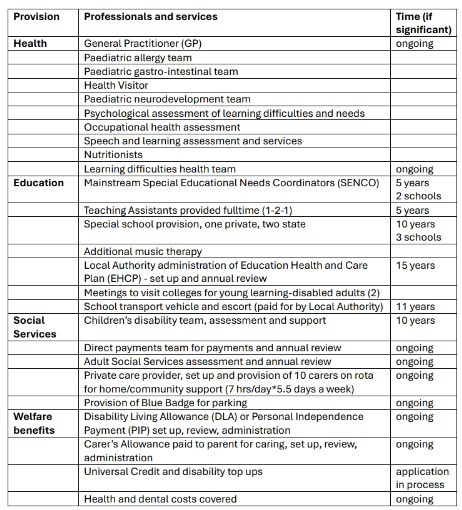The Autism Tribune has a strapline calling on us to ‘free the next generation from neurological harm’ and this post turns to the economics of the case. I know that being a parent of a child with severe autism is all about less grubby things such as love and the remarkable human capacity to keep going when it looks like everything is against you, but money matters a lot. We are part of a national community that is being asked to pay for the services that our children need because they can’t look after themselves. The rising costs of these services, not least because of increasing demand, is now hitting home. Although no-one wants to talk about it in polite company, autism is literally bankrupting our government.
This post has been sobering to write. I’ve listed all the government-provided services and benefits that we have encountered in caring for our son (now 21). The table below has 26 rows, each capturing a different arm of the state, some delivered by national government and others provided by local government. Some of these encounters have been relatively short-term, to secure an assessment or access provision, but others are ongoing, costing thousands of pounds every year. Given that autism is a life-long condition, our son alone will end up costing the community millions of pounds, with knock-on effects for everyone else.
UK-government-funded services encountered in our experience of caring for a son with severe autism over the last 20 years
It is remarkable that we’ve had encounters with so many professionals. Each initial meeting has required a repeat of the core information about our son’s disability and his needs, and another round of forms have been completed and stored. The cost of professional form-filling for us alone must be huge.
Over the past 30 years, there has been a quiet explosion in what could be called the Autism Service Delivery (ASD) sector that now constitutes thousands of state-funded organisations and associated activities. As the incidence of autism has increased, the ASD sector has grown accordingly, and growing numbers of people are involved in this arm of government-funded provision.
Research from the London School of Economics (LSE) has put the cost of these services and the loss of earnings associated with autism at £32 billion a year (for 2014, see cover page included below). Given the dramatic increase in the numbers of people with autism over the subsequent decade, this number must be far higher by now. In a press release accompanying the research, the lead author, Professor Martin Knapp, told the BBC that "We need to use our resources earlier, identify people earlier and try to provide therapies and support that makes it easier to manage the condition." However, he didn’t say that we have to find out what is causing the problem and stop it before it bankrupts the state. Autism is being normalised, and services and costs are rising accordingly.
Our new Labour Government has just delivered a budget to try and raise additional revenue to fund our health, care and welfare services. They have called on employers to pay more tax on a per-capita basis and this is now triggering a reduction in labour demand and increased rates of redundancy. In attempting to fill the public coffers they have reduced the size of the bath while leaving the plug out, finding themselves in the worst of both worlds. Income is going down, while service demand continues to rise. Without addressing the causes and consequences of rising numbers of people living with chronic ill-health and disability – of which severe autism is just one very expensive example – this fiscal nightmare will only get worse.
The Autism Tribune is here to wave the red flag on severe autism, asking the difficult questions about why so many of our children are getting so sick. In all our encounters with the bureaucracy of the state, there has been no space to ask the bigger question of ‘why?’ The ASD-sector is focused on providing services and these in turn, have helped to normalise the condition. Everyone knows someone who is living with or supporting someone with autism. However, rather than sounding alarm, these numbers have fuelled the growth of a movement to celebrate autism and trumpet neurodiversity. Autism has been swept up in the wider currents of identity politics that aim to challenge established norms around race, gender and disability. These politics are preventing us from facing up to the severity and scale of the challenge and it represents a disaster for those living with severe autism, their families, and the next generation.
As outlined in my previous post, the shifting politics now underway in the United States provides an opportunity to puncture this madness. We can join parents and politicians who are prepared to face the challenging question of ‘why?’ If we keep asking ‘why?’ we can focus attention on finding out what has gone wrong for our children and stop pretending that everything is alright. Our son will end up costing millions of pounds and there at least a million people now living with autism in the UK. This a human and fiscal catastrophe. Wishful thinking won’t wish it away. Parents like us can say this in public when others fear to speak out. If enough of us speak, we might find people from the Autistic Service Delivery industry and the tax-paying public joining us too.





